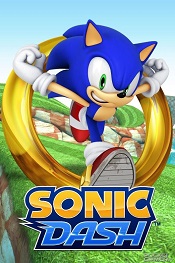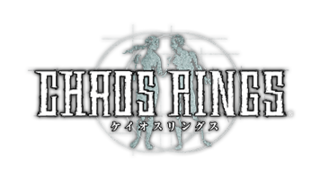Yetisports is a series of online flash games created in 2004 by Austrian studio Edelweiss Medienwerkst and later by ROOT9 Medialab.

Sonic Jump is a 2005 vertical platform game developed by AirPlay and Sonic Team, and published by Sega for the digital distribution service Sonic Cafe, initially only available in Japan for mobile phones before being ported to iOS and Android and released in other regions in 2007. Unlike other games in the series, Sonic Jump doesn't involve running from left to right, but instead, Sonic automatically jumps up the screen, with the player needing to tilt the phone to move him from left to right. The original game's graphical style is based on the Sonic Advance series, which had ended shortly before Jump's release.
Exient Limited is a video game developer and publisher based in the United Kingdom and Malta. Developing for handheld, mobile, console, VR and PC platforms, Exient grew a name for designing and developing popular series' games to portable systems. It is known for its ports of various games in the Madden NFL, FIFA, Need for Speed, and Tiger Woods PGA Tour series for Electronic Arts and for developing numerous titles in the Angry Birds series. The company was incorporated in 2000 and began operations in January 2001.
Brothers in Arms is a tactical shooter video game series by Gearbox Software, consisting of ten individual games. The core series consists of the first-person shooters Brothers in Arms: Road to Hill 30 (2005), Brothers in Arms: Earned in Blood (2005), and Brothers in Arms: Hell's Highway (2008). The storyline is set against the backdrop of the liberation of Western Europe during World War II. It has mainly been released for Windows and MacOS platforms as well as sixth and seventh generation consoles and some mobile devices.

Edge is a puzzle-platform game developed by Mobigame for PC and iOS devices. The objective is to guide a rolling cube through maze-like levels and reach the goal. Originally released on the App Store in December 2008, it has been removed and re-added to the store multiple times due to a trademark dispute with Tim Langdell of Edge Games, concerning the use of the word "Edge" in the title. This had caused the game to be briefly released as Edge by Mobigame and Edgy, before ultimately returning to the App Store under its original name in January 2010. The game was released on multiple platforms including mobile phones, PlayStation Portable, Windows, Mac OS X, Linux, Android, Wii U, and Nintendo 3DS. It was released on Steam in August 2011 by publisher Two Tribes.

Call of Duty: Black Ops – Zombies is a spin-off game of the Call of Duty series' Zombies mode and the sequel to Call of Duty: World at War – Zombies. Developed by Ideaworks Game Studio and published by Activision for the iOS and Android platforms, it was launched in select countries on December 1, 2011.

Kingdom Rush is a 2011 tower defense game developed by Ironhide Game Studio and published by Armor Games. In the game's medieval fantasy setting, players take control of a general serving under King Denas of Linirea, who must defend the land from an onslaught of evil monsters. Each level is composed of a number of pre-set roads, which the player can place defensive towers around to fight off the approaching monsters. Slaying enemies gives the player gold, which they can use to buy new towers or upgrade existing ones to improve their capabilities.
Kairosoft is a Japanese video game developer located in Tokyo, Japan that has created a number of simulation games for cell phones, PCs and Nintendo Switch. Founded in 1996, the company has developed a number of mobile games for the Japanese market and has found great success in porting them to the modern iOS and Android operating systems. The company was ranked 30th in Pocket Gamer's "top 50 developers of 2012" list.

Pocket Planes is a business simulation video game developed by NimbleBit for iOS. It was initially released on 14 June 2012. In October 2012, the game became available on the Mac App Store. An Android version, ported and published by Mobage, was released on 22 September 2012. The game was removed on 24 September 2015 from the Google Play Store, however was re-released 17 March 2022. The game is still available on iOS App Store in selected regions. An update to the iOS version is also planned and will see the game available again in all countries.

Happy Wheels is a side-scrolling ragdoll physics-based platform browser game developed and published by Fancy Force. Created in 2010 by video game designer Jim Bonacci, the game features several player characters using various and often atypical vehicles to traverse the game's many user-generated levels. The game is best known for its graphic violence and the amount of user-generated content its players produce on a regular basis, with game maps shared on a public server. According to Bonacci, a sequel, which he has been working on since at least 2013, is still in development as of December 2020.
GROW is a series of Flash or HTML5-based puzzle games created by On Nakayama, a Japanese indie game developer, and posted to his website, eyezmaze.com. The series, which was launched on February 7, 2002, comprises 12 full games, 7 minigames, and 1 canceled game. The most recently released title was published in June 2018. The games all feature a simple click-button interface requiring the player to determine the correct combination of buttons to click to maximize visual reward and ultimately to achieve the good ending. Graphically spare and minimalist, GROW games employ a cute aesthetic and often include creatures and characters taken from On's other games like those in the Tontie Series.

Sonic Dash is a 2013 endless runner mobile game developed by Hardlight and published by Japanese game studio Sega. It is Hardlight's second Sonic the Hedgehog game, the first being 2012's Sonic Jump. The game was released in March 2013 for iOS, November 2013 for Android, and December 2014 for Windows Phone and Windows, along with an arcade release in November 2015 as Sonic Dash Extreme. It was initially released as a paid application, but was made free-to-play a month after its iOS release.

The Room is a puzzle video game developed by Fireproof Games. The game was originally developed for the iOS platform and released in 12 September 2012. The Android version debuted as part of a Humble Bundle in March 2013 and was subsequently released on Google Play. A free expansion for the title was released in August 2013. An enhanced version of the game was released for Microsoft Windows in July 2014, and for the Nintendo Switch in October 2018.

Solipskier is a sports video game for Adobe Flash, iOS, and Android developed and published by Mikengreg, the two-person team of Michael Boxleiter and Greg Wohlwend. In Solipskier, the player draws the snowy slope for an on-screen skier to pass through slalom gates and tunnels. The character accelerates with downhill sections and can launch into the air to perform tricks and earn a higher score. The idea came from a brainstorming session about parallax scrolling with speedy action in the foreground and the ability for the player to "paint" the terrain. It was Boxleiter and Wohlwend's first game to receive public appreciation. It was released August 29, 2010 to generally favorable reviews and was a runner-up in the 2011 Game Developers Conference Independent Games Festival's Best Mobile Game category.

Sid Meier's Civilization Revolution 2 is a 4X turn-based strategy video game for portable platforms, developed in 2014 by Firaxis Games with Sid Meier as designer. It is a spin-off of the Civilization series and a sequel to Civilization Revolution.

Asphalt Overdrive was a 2014 endless running racing video game published by Gameloft and developed by their Madrid studio. The eleventh major game of Asphalt series. After a showcase in June 2014 at the E3 event, it was released in September 24, 2014 for iOS, Android and Windows Phone, Windows 8.1. The game is officially retired and no longer supported.

Hitman: Sniper is a 2015 mobile shooting gallery video game in the Hitman series by Square Enix Montréal. As the series' mainstay protagonist Agent 47, the player looks through a first-person sniper scope vision on their touchscreen device to assassinate several powerful figures who have assembled at a lakeside compound without alerting their associates. The player uses the environment to find creative ways to kill these targets, sometimes prompted by secondary objectives. Through mission progression, the player unlocks more powerful weapons and new weapon abilities.

Chaos Rings is a role-playing video game series released primarily on mobile platforms. It is developed by Media.Vision and published by Square Enix. The eponymous first game in the series was released for iOS in 2010, then later ported to other mobile and portable platforms including Android and PlayStation Vita. There are currently four games in the Chaos Rings series, and each uses the same gameplay base. Effective May 31, 2016, Square Enix ended distribution of the first three games in the series on Google Play and Apple's App Store, leaving Chaos Rings III as the only title still available for download or purchase on those markets. Currently, all titles in the series, except Chaos Rings III, are still available for purchase and download on Amazon's App Store.

Final Fantasy XV: Pocket Edition is a 2018 action role-playing game co-developed by XPEC Entertainment, SummerTimeStudio and publisher Square Enix. The title is an abridged version of the 2016 title Final Fantasy XV, remaking its storyline, graphics, and gameplay for mobile devices. Originally released for Android and iOS, it was later released for Windows 10 through the Microsoft Store, PlayStation 4, Xbox One and Nintendo Switch. The console versions were released under the title Final Fantasy XV: Pocket Edition HD. Split into ten chapters, the game follows protagonist Noctis Lucis Caelum and his party across the world of Eos, with players navigating semi-linear environments and fulfilling quests to advance the story. The first chapter is available for free, while subsequent chapters must be purchased.

Yo-kai Watch: Wibble Wobble is a mobile puzzle spin-off title to the Yo-kai Watch video game series. It was released in Japan on October 21st, 2015, and then was released worldwide on March 2016 and 2017. As announced on April 2, 2018, the international versions of the game were permanently shut down on May 31, 2018.












